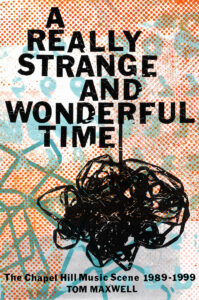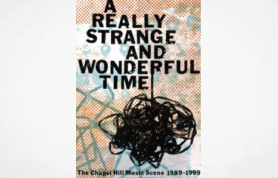The Telecommunications Act of 1996 was enacted by the 104th Congress on January 3 and signed into law by President Clinton on February 8. It was a big overhaul of American telecommunications code—the first significant one in sixty years. For the first time, the Internet was included for broadcast spectrum allotment.
Because the act deregulated telecommunication and broadcast markets and eliminated a cap on nationwide radio station ownership, it became a checkered flag for a small number of corporations to snap up commercial radio stations across the country and homogenize playlists.
Tom DeSavia had been working for the performance rights organization ASCAP since 1989. In January, he was hired to do A&R for Elektra Records. “There was regionalism in music,” Tom said. “You knew where your band was from the same way you knew your sports team. We knew The Cars were from Boston. We knew R.E.M. was from Athens. We knew The Ramones were from New York. When you went to Minneapolis, Soul Asylum would be on the radio. When you went to Texas, you’d hear Jimmy Dale Gilmore.
“This was the beautiful part,” Tom said. “If a record did well and it wasn’t just on locals-only play, then radio stations could see how it was performing in all these different markets. If you looked at the radio charts, you could see the song spider-webbing out across the country.
“Clinton deregulated radio,” Tom said. “Then companies like Affinity and Clear Channel got the right to buy all these stations and automate them. Pretty quickly we got Matchbox Twenty World. It used to be I’d go to Chapel Hill, turn on a station, and hear The dBs or Don Dixon. Then suddenly, I’m going to Chapel Hill and hearing Matchbox Twenty. I’m hearing Creed. It’s like, ‘Wait— this sounds just like the shitty radio in that other town!’”
The act…became a checkered flag for a small number of corporations to snap up commercial radio stations across the country and homogenize playlists.
Southern Culture on the Skids had just finished extensively touring Dirt Track Date when they were dragged back out again. “Back then the radio guys had to test markets,” Rick Miller said. “Some guy in a modern rock station in Tampa played ‘Camel Walk’ on a whim because he liked it. Suddenly, people were all over it. Geffen called us up and said, ‘You got to get back out on the road. We’re doing a big push!’”
“We were tired,” Rick said. “On that stretch we did about three hundred out of three hundred and sixty-five days on the road.” SCOTS was effectively gone for the entire year.
Spatula’s first release of the year was Medium Planers and Matchers, recorded in late 1995 and released on Jesus Christ Records. The band was now a three-piece, augmented by Chris Eubank on cello. With its round, low pedal tones and melodic counterpoint, Chris’s cello gave Spatula’s music a wider aspect ratio. On “Service Entrance Fiasco,” Chuck Johnson’s introductory guitar part wouldn’t be out of place on The Velvet Underground & Nico. Then the band launches into a crooked tarantella.
Like Polvo, Ben Folds Five was ready to level up. “We were signed to Caroline, which was owned by Virgin but had a lot of autonomy,” Robert Sledge said. “They were the most successful and largest indie distributor in America. They seemed to have a good support network.
“Early on, we realized that there was a ceiling to it,” Robert said. “It wasn’t the same kind of growth that R.E.M. or The Police had done on I.R.S. Records. Indie records cost $10,000 to make with the expectation to sell perhaps 10,000 records total. It was very college-based. Every good college radio station would get serviced, and you’d do a tour of colleges. If you could get some national touring, then you would go to a major label.
“Early on, someone at Caroline said, ‘I hope we sell three thousand Ben Folds Five records!’ ” Robert remembered. “Ben turned to me and said, ‘Three thousand? That’s all?’ It hadn’t dawned on me. We think we’re this great band and we wanna go out and play for the whole world, and they only expect us to sell three thousand records? That was a gut punch. The writing was on the wall.”
__________________________________

Excerpted from A Really Strange and Wonderful Time: The Chapel Hill Music Scene: 1989-1999 by Tom Maxwell. Copyright © 2024. Available from Hachette Books, an imprint of Hachette Book Group, Inc.
Source




